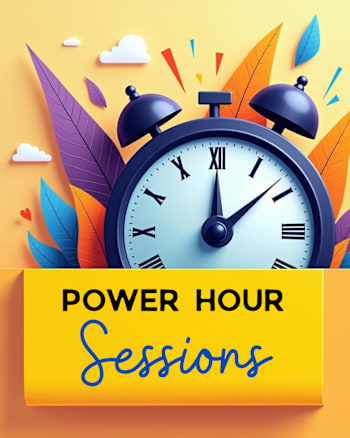Blog

How you end your day shapes not just your night’s rest, but also the mindset you bring into tomorrow. When evenings are rushed or cluttered with to-dos, worries, or distractions, it’s hard to truly reset.
Creating a simple evening reflection ritual can turn your days into powerful stepping stones for growth and gratitude.
Why Evening Reflection Matters
- Closes the Day With Intention – Helps you process what happened and prepare for what’s next.
- Builds Gratitude – Focusing on what went well...

How you start your morning has the power to shape your entire day. A rushed, reactive morning can leave you feeling scattered. A purposeful, grounded morning? That’s your secret weapon for clarity, focus, and resilience.
You don’t need a 2-hour routine filled with green juice, journaling, and meditation (unless you want that). What you do need is a ritual that consistently reminds you who you are and what you value—before the world tells you otherwise.
⸻
Why Morning Rituals Matter
• They Set...

In a world that rewards hustle, noise, and constant output, stillness can feel like weakness. But the truth is, stillness isn’t about doing nothing—it’s about creating space for clarity, wisdom, and renewal.
Think of stillness like a pause in music. Without the quiet moments, the notes lose their impact.
Why Stillness is Powerful
- It Sharpens Your Mind – Without constant distractions, you can hear your own thoughts.
- It Builds Emotional Resilience – Pausing before reacting allows you to choose a...

Many of us were taught that saying yes makes us kind, likable, and helpful. While there’s truth in generosity, there’s also a hidden danger: if you never say no, you slowly erode your own boundaries, time, and energy.
The reality?
Saying “no” isn’t selfish—it’s self-preservation. It’s choosing where your energy goes so you can give your best instead of what’s left over.
Why “No” Feels So Hard
- Fear of Disappointing Others – We don’t want to let people down.
- Social Conditioning – Especially for...

Letting go sounds peaceful in theory—just release what no longer serves you and move forward, right?
But in reality, it often feels like ripping out a piece of yourself. Whether it’s a relationship, a job, a dream, or even a long-standing belief, we fear that letting go means losing part of who we are.
Here’s the truth:
Letting go isn’t about losing yourself—it’s about clearing space so more of your true self can come forward.
⸻
Why We Hold On Too Long
• Comfort Zone: Even if it’s unhealthy, it’s...

We often say we want “more” in life—more success, more love, more freedom—but if you ask why you want those things, the answer sometimes stops at a vague “because it would make me happy.”
But here’s the truth: sustainable happiness and fulfillment are built on alignment with your core values—the deep, non-negotiable principles that guide your decisions, even when life throws chaos your way.
Why Core Values Matter
Think of your core values as your personal compass.
When they’re clear, you:
- Stop...

Every relationship—whether personal, professional, or casual—either adds to your energy or takes from it. Some connections make you feel stronger, lighter, and more capable. Others leave you feeling small, tense, or quietly exhausted.
This week is about taking an honest inventory. Not to judge or label people as “good” or “bad,” but to understand how their presence impacts your life—and whether that impact aligns with your values, your growth, and your peace.
Questions for Your Reflection
Grab...

When life feels noisy, chaotic, or overwhelming, the instinct to retreat can be strong. But there’s a difference between healthy solitude and cutting yourself off from the world.
Peace doesn’t have to mean isolation. In fact, true peace can thrive right in the middle of a connected, fulfilling life.
What Reclaiming Peace Really Means
Peace is not about avoiding every challenge—it’s about finding your center no matter where you are or who you’re with.
It’s an inner steadiness that makes you feel...

Letting go can feel like losing—whether it’s a relationship, a habit, a job, or even a dream you once held close. But the truth is, when something no longer aligns with who you are or where you’re going, letting it go isn’t failure.
It’s self-respect. It’s space-making. It’s giving your future self room to breathe.
Alignment isn’t about perfection—it’s about connection between your values, your choices, and your daily life. When those are out of sync, it drains your energy and clouds your...

Difficult conversations are often the ones we put off the longest—the ones we rehearse in our heads, lose sleep over, or avoid entirely.
But what if those moments could become opportunities, not just for resolution, but for empowerment?
Empowering conversations don’t mean they’re free from discomfort. Instead, they shift the focus from winning or avoiding conflict to creating clarity, mutual respect, and self-alignment.
The Empowerment Mindset for Hard Conversations
- Know Your Why Before You...

We often associate power with loud declarations, bold actions, and standing firmly in the spotlight. But one of the most profound forms of power is quiet—unseen, uncelebrated, and internal.
Protecting your energy isn’t about building walls or retreating from the world. It’s about creating intentional boundaries, saying no without guilt, and recognizing when your peace matters more than proving a point.
Why Energy Protection Matters
Your energy is the currency of your attention, your creativity,...

End-of-week introspection: link identity to action and reinforce growth habits as your new default.
Prompts:
- Three actions this week that aligned with your ideal self.
- What voice or feeling supported them?
- Where did you resist, and why?
- What’s your next intentional action in week 3?
Reflect, journal, share or just sit in the awareness.
Playlist:
https://open.spotify.com/playlist/5pLkJcQASaqhM6bZTmP18c?si=3IO7-xeyRAK-Dni0OhQCjQ&pi=ryId9oNMQ_GxH
Reflect...

Not every win comes with a medal or a mic drop. Some victories are quiet, personal, messy, or hard-won. This playlist celebrates them all—big or small, public or private, fierce or tender. Hit play and honor your progress. Victory looks good on you.
Playlist:
Victory Looks Good On You
https://open.spotify.com/playlist/3bfqesYIXSHl3C5VTYOAlO?si=bFcSEmj4SLejPis-iyR8PQ&pi=ajUiLYuDSM-9N
Prompt:
- Choose one thing you did this week that felt small but...

Create blocks of dedicated, high-impact focus—time carved out for intentional progress. These blocks anchor your identity in action.
Playlist:
Power Hour Sessions
- “Run the World (Girls)” – Beyoncé
- “Unstoppable” – Sia
- “Don’t Stop Me Now” – Queen
- “Hall of Fame” – The Script ft. will.i.am
- “Lose Yourself” – Eminem
- “Dream On” – Aerosmith
- “Eye of the Tiger” –...

Your inner voice shapes your reality. What if your self-talk supported you instead of sabotaging? Today we reframe your narrative—to ally, not criticize.
Playlist:
Kind Mind, Bold Voice
- “Lovely” – Billie Eilish & Khalid
- “I Am Light” – India.Arie
- “Beautiful” – Christina Aguilera
- “This Is Me” – Keala Settle
- “Brave” – Sara Bareilles
- “Man in the Mirror” –...

Power isn’t one moment—it’s the daily choices that align with your values. Today, we design decisions that reflect your true self.
Playlist:
Moment by Moment Power
- “Don’t Stop Me Now” – Queen
- “Livin’ on a Prayer” – Bon Jovi
- “Titanium” – David Guetta ft. Sia
- “Can’t Hold Us” – Macklemore & Ryan Lewis ft. Ray Dalton
- “Man in the Mirror” – Michael Jackson
- “...

What in your schedule, relationships, or mindsets deserves a meaningful cut? Today is about clarity: carving space by removing what no longer serves.
Playlist:
Bold Cuts & Fresh Starts
- “Cleanin’ Out My Closet” – Eminem (metaphoric)
- “Roar” – Katy Perry
- “Let It Go” – Idina Menzel
- “Shake It Out” – Florence + The Machine
- “Good as Hell” – Lizzo
- “Stronger (What Doesn’t Kill You)” – Kelly Clarkson
- “Human” – Rag’n’Bone Man
- “You Learn” – Alanis Morissette
- “Best...

Acknowledge the past without letting it define your future. Today is about honoring your journey—and actively participating in the next chapter.
Playlist:
Story of Becoming
https://open.spotify.com/playlist/3S5d0rKMcyjukltNHunbcQ?si=K1aWDF1mS-GWXrD-gUU45A&pi=cpeBW7iRQfKGU
(Mix of reflective, hopeful, growth-themed songs)
- “Glory” – John Legend & Common
- “Eye of the Tiger” – Survivor
- “Unwritten” – Natasha Bedingfield
- “Rise Up” – Andra Day
- “Wings” – Little Mix
- “Believer” – Imagine Dragons
- “...

There’s a difference between speaking and being heard. The final step in reclaiming your voice is not just about saying the words—it’s about allowing yourself to take up emotional, mental, and personal space. It’s about resonance.
To be heard is to know that your truth matters not just to you, but in the world. It’s where courage meets connection. It’s how we heal and how we help others heal too.
Today’s Challenge: Share Your Voice Where It Counts
- Call a friend and share something real. Not...






